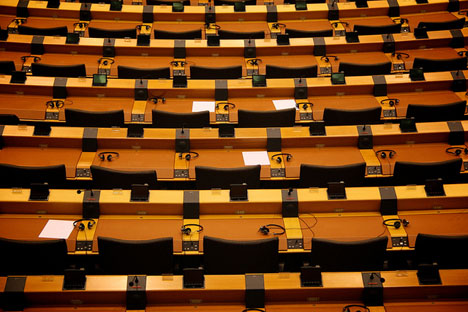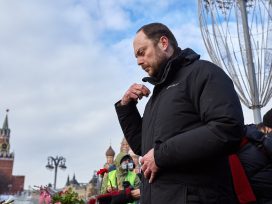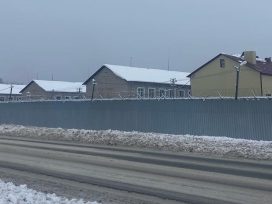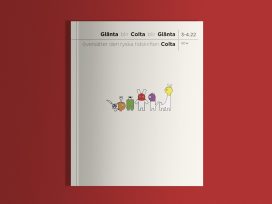The fact that many European far right parties have strong political links to some Kremlin circles and a strong pro-Putinist agenda is a commonplace that everybody is aware of. Sensationalist findings have played a role here. To name just a few: in France, Marine Le Pen received money from a bank close to the Kremlin to finance her campaign for the National Front (and has asked for more). Béla Kovács, the Hungarian MEP for Jobbik nicknamed “KGBéla”, had his immunity suspended after being accused of espionage. Recently, a marginal Polish politician Mateusz Piskorski was arrested by Poland’s Internal Security Agency, allegedly on suspicion of spying for Moscow.
Among European far right parties, we can find several others that are strong advocates of Putin’s Russia. In a 2014 study, we found that 15 out of the 24 far-right parties examined support Russia politically, and four more were rather open to the Russian regime. Among the most committed were not only Jobbik and Front National, but the Italian Lega Nord, the Flemish Vlaams Belang, the Austrian FPÖ, and Golden Dawn in Greece as well. Their pro-Russian stance is easy to explain on ideological grounds: Russia’s political system with a strongman leader, its anti-human rights agenda, constant references to family values and Christianity, and to “national interests” overriding free-market mechanisms, offer a good model for several European far-right parties.
The radical Left’s connections to Russia have received much less attention so far, yet the patterns are similar. A study prepared for the Institute for Statecraft by Political Capital claims that, while the far-right parties’ pro-Putinism is more out in the open, far left parties’ pro-Russian strategy is subtler, but equally strong and persistent.
Attraction with inhibition
Most European leftist parties rarely praise Putin or his regime openly. They call for “neutrality”, “peace”, and “stopping western aggression” instead. The majority of European far left parties display a double-edged strategy of rhetorical self-containment and the denial of pro-Putinism with an almost unconditional support of the Kremlin’s core geopolitical goals.
The radical Left requires more attention for several reasons. First of all, like right-wing politicians, some radical left MEPs actively legitimize the Russian state’s actions. Alongside their political opponents from the far Right, Greek, German and Polish radical leftist politicians participate in so-called election observer missions in Crimea, Donetsk, Luhansk and other post-Soviet states, to declare these elections free and fair (which they aren’t).
Germany’s Die Linke party went even further. Some of its leaders delivered “humanitarian aid” to the self-proclaimed “Donetsk People’s Republic”, and met with its anti-Semitic leader Aleksandr Zakharchenko. A Die Linke politician recently became the first German politician to declare that Crimea legally belongs to Russia, after his visit to the peninsula.

European Parliament, Brussels. Photo: Sami Haidar. Source: Flickr
The radical left group European United Left/Nordic Green Left (GUE/NGL) in the European Parliament supports the Kremlin with words and votes (in 78 per cent of cases), in the Council of Europe and OSCE general assemblies – especially when it comes to issues concerning Ukraine and Syria.
Some of these forces can influence government policy as well: Greece’s Syriza party, in government with its right-wing populist coalition partner ANEL, works to ally itself with Russia on energy, foreign affairs and defence. Given that Russia is more popular among the Greek population than the European Union, this tactic can pay political dividends.
Beneficiaries of the crisis
Radical left parties are also receiving increasing support domestically in Europe, just like the radical Right. The 2008 financial crisis, austerity measures and austerity fatigue have led to a radical left resurgence in Europe.
Between September 2008 and June 2014, far-left parties were able to increase their share of votes and their representation in national parliaments and the European Parliament to 150 per cent of pre-crisis levels. Currently, the share of MEPs of the radical GUE-NGL group is seven per cent – the share of the genuine far-right parties in the ENF group and among non-affiliated MEPs is the same.
Meteoric far left rises such as those of Syriza (Greece) and Podemos (Spain) are rare. But Syriza is the main state force in Greece; Die Linke is strong in eastern Germany, present in regional governments and has a minister-president in Thuringia. Cyprus’ communist AKEL party gained more than 30 per cent of the vote in the last parliamentary election and used to be in the government. Sinn Fein is currently the third most popular party in Ireland and has been an important player on the political scene for decades.
Furthermore, radical left forces are traditionally more willing to cooperate with one another on the international and European level than the far Right. This further increases their importance. While the left-wing GUE-NGL block in the European Parliament has existed since 1995, the times when radical right parties are able to band together are rare exceptions. While the parliamentary grouping Europe of Nations and Freedom (ENF) was formed in 2015, and there are several attempts to bring together radical right forces, these are rarely efficient. A previous attempt to found a bloc in the EP, in 2007, lasted less than a year before collapsing due to confrontation between the Italian and the Romanian nationalists. Meanwhile, several international leftist and socialist organisations are providing a good platform for networking and cooperation.
That said, it is difficult to understand why radical left parties that profess secular, egalitarian and pacifist politics admire Russia’s “postcommunist neoconservative” system, which shows strong authoritarian and chauvinist tendencies, emphasizes the role of religion, reproduces and strengthens mass inequality, promotes an aggressive nationalist-imperialist geopolitical agenda and repeatedly threatens the West with nuclear weapons. The core values of the Russian regime, often mentioned as the nation, the family and Christianity, are rarely guiding values for left-wing parties.
The Left’s affiliation with the Kremlin is better explained via the “the enemy of my enemy is my friend” principle as applied in contexts such as selective anti-imperialism, anti-capitalism, and anti-Americanism. Likewise, the state-controlled economy, which promises to keep “big capital” in check, is an attractive model for many anti-capitalists.
Why Russia?
This is how the radical left argues its cause in this context.
First of all, there is “peace and neutrality” rhetoric. A typical argument is that it is only the United States and the West that are provoking conflicts in eastern Europe or in the Middle East. Therefore, “pacifism” provides an ideological foundation for a permanent criticism of “western aggression”.
A number of parties, such as Die Linke, and back in around 2012, Syriza as well, demanded their countries leave NATO because of its “aggressive” stance, tendency towards “imperialist interference” in the affairs of sovereign states, and the dominance of the US in the military alliance. Calls for leaving NATO are justified by the argument that “neutrality” is needed to maintain peace, while it ignores the fact that NATO allies could enjoy the luxury of peace most of the time in the last decades.
The second typical argument revolves around autonomy and self-determination. The Left is traditionally supportive of autonomy movements, and promotes referenda as a tool to express the will of the people. This position was abused by the Czech Communists and Syriza, among others, in the Russian-Ukrainian conflict to legitimize the so-called separatists and their “referendum” in Crimea and “elections” in the Donbas region of Ukraine. What was missing is the mention of the fact that these “elections” were not recognized by the OSCE because of the presence of tanks and armed men next to the ballot boxes.
The third typical argument concerns “anti-fascism“. Just as Putin’s regime simultaneously warns of the rise of the far Right and supports (and is supported by) far-right parties in Europe, the radical Left’s anti-fascism is often selective and one-sided. Radical left actors usually share Putin’s concerns over the “fascist junta in Kyiv” (a bit more difficult to argue for, since the country has a Jewish prime minister). Also, they criticize the EU for being ignorant on the subject. At the same time, they are blind to fascists, neo-Nazis, and anti-Semites on the side of the pro-Russian “rebels” – though examples, such as the anti-Semitic leader of the Donetsk Republic, are numerous.
Then you have victimization: the Left often portrays the Russian and Syrian regimes and eastern Ukrainian rebels as victims of western aggression, ignoring Putin’s and Assad’s violence.
Far-left parties support Russia’s Ukrainian intervention because they accept and legitimize the Russian narrative of a western-backed Nazi coup in the form of the Maidan – putting Russia on the side of the “oppressed”. In Syria, they portray Assad’s Arab Socialist Ba’ath Party as fighting a “counter-revolution” against “western imperialist intervention” and/or Islamists controlled and financed by the West.
Cooperation beyond ideology
The massive international network and the Russian state’s increasing propaganda effort to bring these forces onto a joint Putinist-Assadist platform also plays a crucial role. The Party of the European Left has a friendly relationship with the Communist Party of the Russian Federation. This party, the second most popular party after United Russia, is a pet opposition party that follows the Kremlin line on every crucial issue. While the Rodina (Motherland) party of Russian deputy PM Dmitry Rogozin seems to be the key actor in reaching out to far-right parties in Europe, the Communist party plays a similar role as far as the radical Left is concerned. Given the growing importance of young politicians within the party and its growing popularity, it could become an even more important player in Russia, that will happily celebrate the 100th anniversary of the Bolshevik revolution next year with increasing influence and money to spend.
Furthermore, communist and socialist parties with historic links to the Soviet Union can be found almost everywhere in the world. Russian influence via communist parties reaches well beyond Ukraine and other former member states of the USSR and deep into the Middle East through the Arab socialist-communist parties in Iraq, Syria and Iran. In Syria, some leftists portray Assad’s Arab Socialist Ba’ath Party as a comrade group fighting a “counter-revolution”.
The Kremlin, meanwhile, is not secretive about its strategy of reaching out to Europe’s radical left. Russian foreign minister Sergey Lavrov, for example, recently published a piece in English in Russia in Global Affairs (the “Russian Foreign Affairs magazine”), which explicitly targets left-wing intellectuals and politicians in the West with quotations from George Orwell, and statements to the effect that western European welfare states just copied the Soviet Union’s success.
In order to address the far Left’s relationship with the Kremlin, investigative journalists, policy leaders and intelligence services must acknowledge that these old “comrade networks”, established during Soviet times by the KGB, are still alive. Furthermore, left-wing parties such as Syriza and Die Linke have strong ties to Russia as well, which is partially built on the personal networks and infrastructure from the Soviet era as well. Nikos Kotzias, the Greek foreign minister for example, was an important member of the Communist movements in Greece, with extensive relations to the Soviet Union.
More integrated intelligence services in the EU under the European Council or the European Commission would be an efficient tool to reveal these links, especially given the reluctance of some member states to do so in the light of their economic and political relations with Russia.
On the political level, it is important to point to the pro-Russian connections of radical left parties, and challenge the credibility of such parties in political debates. Given that the radical Left mainly poses a threat to the voter base of the green and social democrat parties (the latter have been rather reluctant to talk about Russian influence), these parties have a vested interest in challenging the radical Left’s contradictory pro-Russian stance, one that completely ignores the anti-egalitarianism, imperialism and ultraconservatism of the Putin regime.
If the loyalties of some European radical left parties towards Russia remains a non-topic in political discourses, the rise of these parties could be even more spectacular in the future. What we observe in Greece, Spain and even Germany – the radical Left taking away votes from mainstream social democratic parties – could become an even more massive trend in Europe. And it could definitely undermine Euro-Atlantic relations.
Radical left political forces show more loyalty towards Russia than the West on defence fields. The radical left-nationalist Greek government, one of the biggest friends in Moscow, has announced its intention to set up joint manufacturing of Kalashnikovs by Russia and Greece, pending the termination of sanctions. Ahead of the upcoming NATO summit, Die Linke is calling for the military organization’s abolition and the creation instead of a military organization that includes Russia and reaches “from Lisbon to Vladivostok“.







